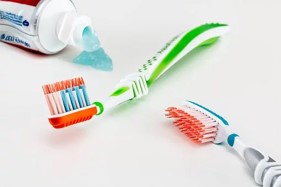Blog
Our Top Tips To Help You Practice Good Oral Hygiene At Home

Looking after your teeth should be an important part of your daily routine. Taking care of your teeth properly will ensure that you prevent any potential dental problems that could come to fruition in the future. And of course, we all want to make sure our smile looks its best!
Here are our ten top tips to help you achieve good oral hygiene at home:
- Don’t go to bed without brushing your teeth
Neglecting to brush teeth at night is a surprisingly common occurrence, as people just want to get to bed! Brushing your teeth morning and night ensures you are removing any plaque built up throughout the day or night that could turn into solid tartar, thus reducing the risk of dental diseases and decay.
- Brush your teeth properly
When brushing your teeth take your time, making sure to hit every spot in your mouth with gentle circular motions.
- Don’t neglect your tongue
Plaque doesn’t just build up on your teeth, but your tongue as well. By making sure to clean your tongue the amount of plaque that can attack your teeth are minimised and you prevent the risk of a bad mouth odour.
- Use a toothpaste containing fluoride
Fluoride is the leading defence against tooth decay. Toothpaste that contain 1,350 to 1,500ppm fluoride are the most effective. Your dentist may advise you to use higher-strength toothpaste if you are at particular risk of tooth decay.
- Floss your teeth
Flossing reduces plaque buildup and lowers any inflammation within the gums by stimulating the blood flow. It is recommended that you floss at least once a day, but it is easier to make sure you floss whenever you brush your teeth.
- Use mouthwash
Using mouthwash reduces the acidity within the mouth, cleans hard-to-brush areas in and around your gums, whilst re-mineralising your teeth ready for the day or night. Ensuring your teeth are at their strongest.
- Limit your intake of sugary and acidic foods
Sugar converts to acid within the mouth and this acid attacks your teeth, which creates cavities and wears down the enamel. By reducing your intake of these foods, you will reduce the acidity level within the mouth thus reducing the risk of dental disease or decay.
- Swap your sugary drinks for water
This has the same effect within the mouth as sugary or acidic food.
- Change your toothbrush regularly
Like anything, your toothbrush wears out after a while and becomes less effective in cleaning your teeth, so it is recommended to replace your toothbrush every three to four months.
- Regularly see the dentist
Keep a calendar with when you are going to see your dentist and keep to your appointments, which should be every 6 months.
If you are ever unsure about what to do to ensure good oral hygiene, ask your dentist for advice.
If you would like some advice or would like to book an appointment, please contact Shifnal Dental Care on 01952 460119 or fill out our enquiry form. Our treatment coordinator Katherine would be happy to speak to with you.
Share this post:
